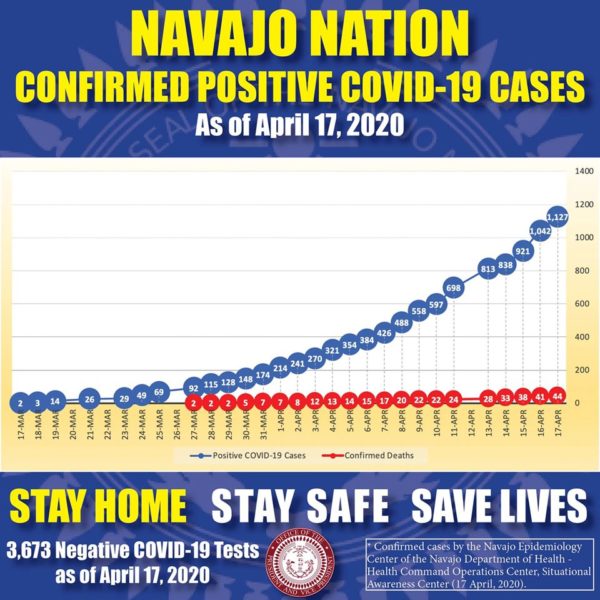
- Details
- By Levi Rickert
WINDOW ROCK, Ariz. — The total confirmed cases of COVID-19 (novel coronavirus) has grown to 1,127 on the Navajo Nation. Just one month ago, on March 17, the first two cases were announced. From Thursday to Friday, the cases grew by 85.
The total deaths grew by one to bring the death toll from COVID-19 to 44.
Friday’s numbers were released by the Navajo Department of Health and Navajo Area Indian Health Service, in coordination with the Navajo Epidemiology Center.
The report also includes 3,673 total negative test results as of Friday.
The 1,127 confirmed positive cases include the following counties:
- Navajo County, AZ: 316
- Apache County, AZ: 168
- Coconino County, AZ: 203
- McKinley County, NM: 235
- San Juan County, NM: 153
- Cibola County, NM: 13
- San Juan County, UT: 14
- Socorro County, NM: 13
- Sandoval County, NM: 12
The Navajo Nation will enter in a curfew beginning at 8:00 p.m. on Friday until Monday, April 20 at 5:00 a.m. (MDT).
The Navajo Police Department will once again enforce the weekend curfew with road checkpoints. They will also issue citations for curfew violators, which may include up to $1,000 in fines and/or 30 days in jail.
"Everyone should have everything they need for the weekend, so we should not have anyone traveling this weekend except for essential workers and in cases of emergencies. I said this before, we are strong and resilient just like our ancestors. Our people have overcome so much, much worse than COVID-19 and we need to honor and remember all of the sacrifices that our ancestors made for us to be here today. Let’s not be careless, let’s not be selfish, but let’s rise up and beat this virus together,” Navajo Nation President Jonathan Nez said.
Last weekend, the Navajo Police Department issued approximately 119 citations for individuals who violated the curfew. Stricter provisions are now in place for businesses as well.
For more information including reports, helpful prevention tips, and more resources, please visit the Navajo Department of Health’s COVID-19 website at http://www.ndoh.navajo-nsn.gov/COVID-19. To contact the main Navajo Health Command Operations Center, please call (928) 871-7014.
For up to date information on impact the coronavirus pandemic is having in the United States and around the world go to: https://www.worldometers.info/coronavirus/country/us/?fbclid=IwAR1vxfcHfMBnmTFm6hBICQcdbV5aRnMimeP3hVYHdlxJtFWdKF80VV8iHgE
For up-to-date information about COVID-19, Native News Online encourages you to go to Indian Health Service’s COVID-19 webpage and review CDC’s COVID-19 webpage.
How to help Native News Online: Send us news. Sign up for our daily enewsletter. Follow us on Facebook and Twitter. Share our articles. You can also donate to Native News Online here. Most importantly, take care of yourself. Megwetch.
More Stories Like This
Native News Weekly (August 25, 2024): D.C. BriefsUS Presidents in Their Own Words Concerning American Indians
Native News Weekly (December 14, 2025): D.C. Briefs
Wounded Knee Massacre Site Protection Bill Passes Congress
Two Murdered on Colville Indian Reservation
Help us defend tribal sovereignty.
At Native News Online, our mission is rooted in telling the stories that strengthen sovereignty and uplift Indigenous voices — not just at year’s end, but every single day.
Because of your generosity last year, we were able to keep our reporters on the ground in tribal communities, at national gatherings and in the halls of Congress — covering the issues that matter most to Indian Country: sovereignty, culture, education, health and economic opportunity.
That support sustained us through a tough year in 2025. Now, as we look to the year ahead, we need your help right now to ensure warrior journalism remains strong — reporting that defends tribal sovereignty, amplifies Native truth, and holds power accountable.
 The stakes couldn't be higher. Your support keeps Native voices heard, Native stories told and Native sovereignty defended.
The stakes couldn't be higher. Your support keeps Native voices heard, Native stories told and Native sovereignty defended.
Stand with Warrior Journalism today.
Levi Rickert (Potawatomi), Editor & Publisher

